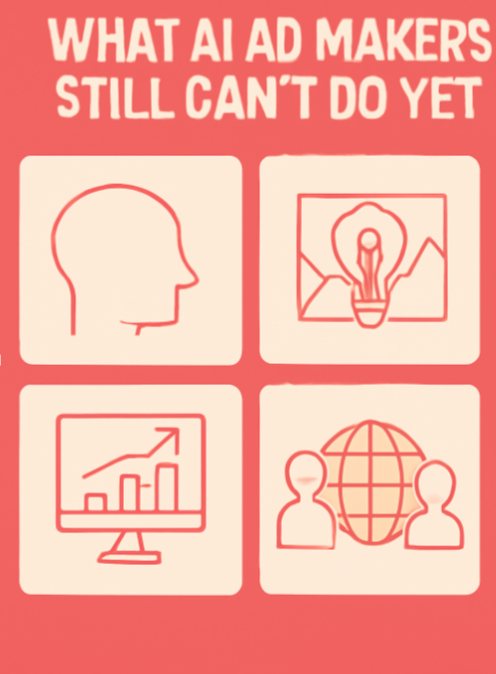What AI Ad Makers Still Can’t Do Yet
Artificial Intelligence has transformed the way businesses create and manage ads. With AI tools, brands can now generate dynamic, customized creatives for campaigns in a fraction of the time it used to take.
AI ad generators efficiency, cost-effectiveness, and speed. But are they the complete solution? Let’s take a look at the areas where AI ad makers still fall short.
Understanding Nuanced Brand Voice
While AI is impressive at generating ad copy, it struggles with deeply understanding and replicating a brand’s tone. The subtlety of brand voice, especially for niche markets, remains elusive. For example, consider a brand’s shift in communication strategy based on seasonality or a cultural event AI doesn’t always catch those nuances. A Facebook ad agency knows that brands need a human touch when it comes to fine-tuning messaging to resonate with the audience on a personal level.
Example: If you’re running ads for a luxury skincare brand, the language needs to evoke exclusivity, trust, and sophistication something that AI can’t always master.
Complex Creative Direction
AI can generate ad creatives based on data inputs, but it still lacks the creativity and artistic vision of a human designer. A best Facebook ads agency knows that successful ads require more than just aesthetics; they need creativity that tells a story, evokes emotions, and aligns with a specific campaign narrative.
AI might be able to create a product image, but it can’t imagine innovative visuals that fit a story-driven campaign. Take ecommerce Facebook ad agencies, for instance: they often create campaigns based on themes, product stories, or customer personas something AI can’t easily replicate.
Strategic Campaign Optimization
AI can help optimize campaigns by analyzing real-time data, but it doesn’t understand long-term marketing goals or strategic nuances. A Facebook ad management agency is adept at making these calls adjusting ad strategies based on broader business objectives, market trends, or shifting customer behaviors. AI lacks that strategic foresight.
AI is limited in making decisions about seasonal campaigns, customer lifetime value, or brand positioning in the market. The human element in managing campaigns allows for flexibility, adapting to changes that AI, with its data-driven but rigid parameters, often misses.
Understanding of Cultural Sensitivity
Cultural nuances play a huge role in how ads are perceived. While AI can scan through large datasets, it cannot completely comprehend the sensitivities tied to different cultures, regions, or even individual demographics. For example, certain humor styles or phrases might be perceived differently across various states or ethnic groups in the U.S. AI ad tools often fail to capture these subtleties.
A Facebook ad agency pricing strategy in different regions, including the U.S., requires an understanding of how an ad may impact an audience beyond just the basic demographics. Human strategists ensure that ads are culturally appropriate and relevant to local preferences.
Adapting to Unpredictable Shifts in Consumer Behavior
AI thrives in environments where data is consistent, but what about sudden changes in consumer behavior? If a sudden trend takes off or a viral meme emerges, AI systems can be too slow to react. Humans, however, can spot these shifts and pivot ad strategies accordingly. Facebook ad agencies in the U.S. know that reacting quickly to trends or unexpected shifts in the market is critical.
For instance, if an influencer suddenly promotes a product unexpectedly or a major competitor drops their prices, a Facebook ad agency can adjust ads to capitalize on the shift, whereas AI would require a more structured dataset to make such decisions.
Integrating Brand Consistency Across Multiple Channels
While AI is great at generating ads for individual channels, keeping the brand’s message and visual identity consistent across multiple platforms requires a human touch. A best Facebook ad agency ensures that a brand’s ad strategy maintains the same tone, messaging, and visuals, whether it’s on Instagram, Facebook, or YouTube.
AI struggles to maintain this consistency when running campaigns across multiple platforms that require adaptation in format, tone, or style. It’s crucial for e-commerce businesses to maintain brand integrity across all touchpoints.
See Also: Exploring Edge Computing and Its Impact on Technology
What AI Can’t Do Yet—And What It Can
While AI offers many benefits, especially for managing large-scale campaigns, the role of human insight in crafting strategic, emotionally resonant, and culturally sensitive ads remains irreplaceable. AI ad tools still cannot offer the intuitive judgment, creative vision, or strategic foresight that is crucial to running highly successful campaigns, particularly for complex Facebook ad agencies handling sophisticated e-commerce strategies.
That said, AI isn’t completely in the dark. When it comes to repetitive tasks like creating variations of ads, testing creatives, or gathering data insights AI excels. It’s the blend of human creativity and strategic guidance with AI’s efficiency and scalability that will continue to shape the future of digital advertising.
Conclusion: Embracing the Future of Advertising
AI ad creators have certainly changed the landscape of advertising, offering speed and efficiency that was previously unimaginable. However, human touchpoints are still necessary for crafting truly compelling, culturally relevant, and strategic campaigns. Whether you’re working with a Facebook ad management agency or a best Facebook ad agency, integrating both AI and human expertise will ensure the best results for your campaigns.





